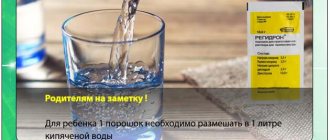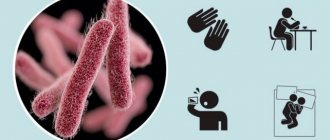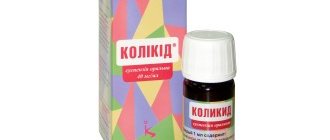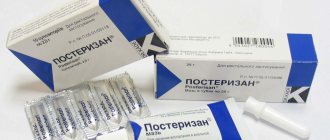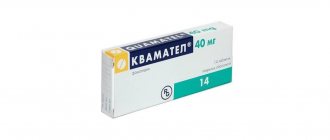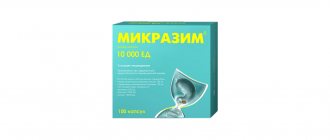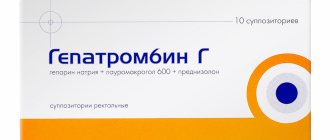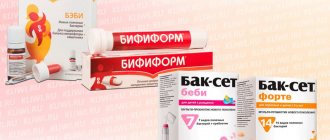Due to the characteristics of a growing child's body, children are more susceptible to various intestinal infections, since they do not yet have a developed protective system. For the treatment of infectious diseases, Nifuroxazide is used - a drug that fights the cause of the disease - various pathogenic microorganisms.
The drug is available in two forms: tablets and syrup. The latter form is best suited for the treatment of intestinal infections in children, even the youngest. Nifuroxazide syrup can be used only as prescribed by a pediatrician, after reading the instructions.
Pharmacological properties of the drug Nifuroxazide
Nifuroxazide is an antimicrobial drug of the 5-nitrofuran group and belongs to the intestinal antiseptics. Blocks the activity of dehydrogenases, inhibits cellular respiration processes, the tricarboxylic acid cycle, and also disrupts protein synthesis in the microbial cell. Reduces the production of toxins by microorganisms. At moderate therapeutic doses it exhibits bacteriostatic activity, and at higher doses it has a bactericidal effect. The drug exhibits activity against gram-positive microorganisms of the Staphylococcus and gram-negative microorganisms of the Enterobacteruaceae ( Escherichia, Citrobacter, Enterobacter, Klebsiella, Salmonella, Shigella, Yersinia ), as well as Vibrio cholerae . Inactive against bacteria of the genus Pseudomonas and the genus Proteus (species Proteus inconstans ), as well as strains of subgroup A of the species Providentia alcalifaciens. After oral administration, Nifuroxazide is not absorbed into the gastrointestinal tract, providing a high concentration of the active substance in the intestine. Trace concentrations of the drug are determined in blood plasma; a small amount is detected unchanged in urine. Excreted in feces. The rate of excretion depends on the dose of the drug taken and the state of motility of the digestive tract.
When should you use Nifuroxazide?
Nifuroxazide syrup has a pleasant taste
Any child suffering from acute or chronic diarrhea caused by certain infectious agents can be helped to cope with the disease with the help of Nifuroxazide.
This antidiarrheal drug, which is based on a nitrofuran derivative, fights various gastrointestinal bacteria, including:
- coli
- shigella
- enterobacter
- Staphylococcus aureus
- salmonella
These bacteria are both gram-positive and gram-negative. Classification is used to distinguish bacteria depending on the structure of their shell. Gram-negative bacteria have stronger protection and it is more difficult for the child’s immune system to fight them.
It should be noted that despite its antibacterial activity, the drug does not have a negative effect on the state of the normal bacterial flora of the large intestine. Indications for the use of the drug are the following factors:
- diarrhea due to an infectious disease
- infectious chronic colitis and enterocolitis
- prevention of possible infectious diseases of the gastrointestinal tract after surgical interventions
- complex therapy of intestinal dysbiosis
Nifuroxazide is used to treat various infectious diseases caused by both gram-positive and gram-negative pathogens.
Special instructions for the use of the drug Nifuroxazide
The drug is not prescribed as monotherapy for the treatment of intestinal infections complicated by septicemia. If there are symptoms of dehydration in the complex use of Nifuroxazide, rehydration should be carried out. The volume of fluid administered and the method of administration (per os, intravenous) should correspond to the severity of diarrhea, age and clinical condition of the patient (for adults - about 2 liters of fluid per day). The drug contains lactose, so patients with rare hereditary forms of galactose intolerance, lactase deficiency or glucose-galactose malabsorption syndrome should not use the drug. During treatment, you should follow a certain diet - do not consume spicy and poorly digestible foods, raw fruits and vegetables, and juices. When using Nifuroxazide, the consumption of alcoholic beverages is contraindicated due to the risk of developing a disulfiram-like reaction, which is manifested by exacerbation of diarrhea, vomiting, pain in the epigastric region, a feeling of heat in the face and upper body, hyperemia, tinnitus, difficulty breathing, tachycardia. Use during pregnancy and lactation . The use of the drug during pregnancy is possible if the expected positive effect for the mother exceeds the potential risk for the fetus. The drug is not excreted into breast milk, so it can be used during breastfeeding. Children. This dosage form is prescribed to children over 6 years of age; For children under 6 years of age, Nifuroxazide is prescribed in a different dosage form. The ability to influence reaction speed when driving vehicles or working with other mechanisms. Nifuroxazide does not affect the reaction rate when driving vehicles or working with machinery, which requires increased attention and speed of mental and motor reactions.
Action of Nifuroxazide
Nifuroxazide syrup - in the treatment of intestinal infections
The product is active against most types of pathogenic microorganisms that cause infectious diseases. The activity of Nifuroxazide even affects strains of infections that are resistant to other antimicrobial drugs.
It is assumed that the action of the drug is based on inhibition of the activity of dehydrogenases, as well as on disruption of protein synthesis in infectious pathogens. Depending on the dose used, the drug has different effects on pathogenic bacteria.
When used in medium doses, the product has a bacteriostatic effect, as a result of which the growth and reproduction of microorganisms slows down. Higher doses of the product destroy pathogenic bacteria.
Buy Nifuroxazide suspension 220mg/5ml 90ml in pharmacies
Instructions for use Nifuroxazide Susp. 220mg/5ml 90ml Dosage forms suspension 200mg/5ml 90ml Synonyms Stopdiar Ecofuril Ersefuril Group Antimicrobial - nitrofuran derivatives International nonproprietary name Nifuroxazide Composition Active substance: Nifuroxazide. Manufacturers Gedeon Richter (Hungary) Pharmacological action Antibacterial. Blocks dehydrogenases and inhibits the respiratory chain, the tricarboxylic acid cycle and a number of other biochemical processes in the microbial cell. Destroys the microbial wall or cytoplasmic membrane, reduces the production of toxins by microorganisms. Activates the immune system: increases phagocytosis of microorganisms and complement titer. After oral administration, it is practically not absorbed and has an effect in the intestinal lumen. Effective against most gram-positive (staphylococci, streptococci, clostridia) and gram-negative (Escherichia coli, salmonella, shigella, klebsiella, enterobacter, vibrio cholerae) pathogenic intestinal bacteria. When infected with enterotropic viruses, it prevents the development of bacterial superinfection. The type of effect (bactericidal or bacteriostatic) depends on the intraintestinal concentration. In acute diarrhea of bacterial etiology, it restores intestinal eubiosis. Side effects Allergic reactions. Indications for use
Acute intestinal infections occurring with diarrhea; chronic intestinal infections - colitis and enterocolitis; dysbacteriosis (disturbance of intestinal microflora) - as part of complex treatment; prevention of infectious complications during operations on the gastrointestinal tract.
Contraindications
1. Individual hypersensitivity to the drug (allergy).
2. The child is under two months old. Method of administration and dosage Nifuroxazide is taken orally, without chewing the tablet, but swallowing it whole. Drink with clean water. The suspension also needs to be washed down. You can take the medicine either before or after meals - it doesn’t matter. However, equal time intervals must be observed between doses.
Nifuroxazide tablets are usually prescribed in the following dosage: Adults - 2 tablets. 4 times a day (i.e. every 6 hours). The dosage of the drug for children over 6 years of age is the same as for adults. Nifuroxazide suspension is prescribed to adults, one measuring spoon (5 ml) 4 times a day. Children over 6 years old receive the medicine in the same dosage. The course of treatment is 5-7 days.
special instructions
During treatment with Nifuroxazide, the patient must follow a diet excluding raw vegetables and fruits, juices, as well as spicy, fatty and indigestible foods. You need to drink a lot of liquid (mineral water, weak unsweetened tea, saline solutions). You should not drink alcohol during treatment, because... Nifuroxazide in combination with alcohol can cause increased diarrhea, vomiting, abdominal pain, difficulty breathing, increased heart rate, a rush of blood to the upper half of the body, and a feeling of fear. Nifuroxazide does not affect the speed of the patient's reactions and ability to concentrate.
Nifuroxazide - instructions for use for children
Features of the use of the drug in pediatrics In pediatric practice, Nifuroxazide is widely used and is considered one of the best medicines for the treatment of intestinal infections. A big plus is the fact that Nifuroxazide does not destroy normal intestinal microflora and, therefore, does not cause the development of dysbiosis.
The second advantage is the rapid action of the drug: the therapeutic effect appears within the first few hours after taking the medicine. And of course, it is important to have a dosage form that is convenient for children - a suspension with a pleasant taste.
Nifuroxazide in children Diarrhea (diarrhea) caused by acute intestinal infections; Intestinal dysbiosis; Prevention of infections during intestinal surgery. Chronic colitis and enterocolitis in children are rare, but if such a pathology exists, then Nifuroxazide can be used to treat it. Contraindications
1. Prematurity.
2. Under two months of age.
3. Allergy to the drug.
Dosage
The dosage of Nifuroxazide suspension for children aged 2-6 months is 2.5 ml or 5 ml twice a day (i.e. every 12 hours). The doctor chooses the dose individually, depending on the severity of the disease. For children from 6 months to 6 years, the dosage is increased: 5 ml of Nifuroxazide suspension three times a day (every 8 hours). For children over 6 years of age, the dosage of the drug is the same as for adults: 5 ml of Nifuroxazide suspension four times a day (every 6 hours). Special instructions In young children (2 months - 1 year), before starting treatment with Nifuroxazide, it is necessary to exclude a congenital disease associated with a deficiency of enzymes that break down sucrose.
Nifuroxazide during pregnancy No studies have been conducted on the use of Nifuroxazide during pregnancy and lactation. In clinical practice, there have been no cases of negative effects of the drug on fetal development. Therefore, treatment of pregnant women with Nifuroxazide is allowed, but only as prescribed by a doctor who evaluates the ratio of the possible benefits of using the drug to the possible risk of the drug affecting the fetus.
